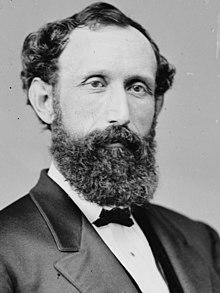William Pitt Kellogg | |
|---|---|
 | |
| Member of the U.S. House of Representatives from Louisiana's 3rd district | |
| In office March 4, 1883 – March 3, 1885 | |
| Preceded by | Chester Bidwell Darrall |
| Succeeded by | Edward James Gay |
| United States Senator from Louisiana | |
| In office March 4, 1877 – March 3, 1883 | |
| Preceded by | Joseph R. West |
| Succeeded by | Randall L. Gibson |
| In office July 9, 1868 – November 1, 1872 | |
| Preceded by | John Slidell |
| Succeeded by | James B. Eustis |
| 26th Governor of Louisiana | |
| In office January 13, 1873 – January 8, 1877 (disputed with John McEnery until May 22, 1873) | |
| Lieutenant | Caesar Antoine |
| Preceded by | P. B. S. Pinchback |
| Succeeded by | Stephen B. Packard |
| Personal details | |
| Born | December 8, 1830 Orwell, Vermont, U.S. |
| Died | August 10, 1918 (aged 87) Washington, D.C., U.S. |
| Political party | Republican |
William Pitt Kellogg (December 8, 1830 – August 10, 1918) was an American lawyer and Republican Party politician who served as the governor of Louisiana from 1873 to 1877 and twice served as a United States senator during the Reconstruction era.
He was one of the most important politicians in Louisiana during and immediately after Reconstruction and was notable for being elected after most other Republican officials had been defeated when Democrats regained control of state politics, though he was also one of the Northern-born politicians who were derided by Southerners as "carpetbaggers" during this period. Kellogg is also notable as one of the few incumbent senators ever to be elected to the U.S. House of Representatives, where he served one term. He was the last Republican U.S. senator from Louisiana until David Vitter in 2005.